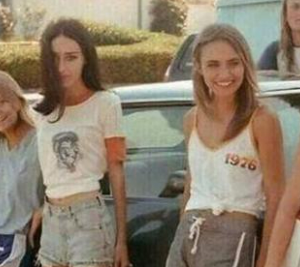It’s interesting to look back on the history of something that we take for granted each and every day. Such is the case with the television, as it wasn’t all that long ago that the Golden Age of TV was taking place.
We wouldn’t have had a Golden age of TV if it wouldn’t have been for Norman Lear. Not only was he a great creator of television shows, he inspired others to follow in his footsteps.

Some of the great shows that were created by Norman Lear include All in the Family, Good Times, the Jeffersons, and Maude. We would invite these families into our living rooms each and every week so we could laugh and cry with them.
Throughout his life, Norman Lear was a true pioneer. He was known for his work on television shows, but he also loved art.
In fact, he amassed quite a in art collection along with his wife over the years and now it is about to go up for auction. The collection will be offered at Christie’s in New York soon, but before it goes up for sale, many people will have the opportunity to see it.
In addition, there are many who knew Norman Lear when he was alive and are taking the time to look back on what he has brought to the entertainment industry in the world.

Billy Crystal
‘I met Norman for the first time in 1975 at the Comedy Store in Los Angeles. It was early in my standup career and this was my first trip to Los Angeles. I was living on Long Island, substitute teaching during the day and trying to be a comedian at night. I did a set and it went very well. Afterwards, I was outside when Mr. Lear came out along with Carl Reiner to say hello. I was overwhelmed. We talked for a few minutes, they both said some lovely things and I didn’t need a plane to fly home.
‘A few days later, as I was feeding my 2-year-old daughter, the phone rang. I answered and a woman asked if it was me, and said, “Hold on for Norman Lear.” “Hello, this is Norman Lear, we met at the comedy store,” he said, as if I wouldn’t know him. “There’s a part on All in the Family coming up next week. You’d play Mike’s best friend, and I think you’d be terrific with Rob [Reiner]. Can you get out here?” He tracked me down and called me at home! There were tons of actors who could have played that part in LA, but he had a feeling about me. It still makes me so emotional.
‘At the first rehearsal, as I was meeting Rob and Sally [Struthers] and the rest of the cast for that episode, Norman stressed how inclusive the process is: if you have any ideas, don’t hesitate. At that moment, I knew firsthand what an amazing producer he was, how he loved the input of others to help make the end product as good as it could be. I was a total newcomer, yet he and Rob and the writers were open to suggestions.
‘Lear’s shows weren’t merely hilarious. Never silly, never pandering, they were honest and pointed, and they were accepted because they were always clothed in the truth. He took on subjects that were real and never backed off.
‘I think his touch is still influencing the way shows are developed today. There’s almost a silent, What would Norman do?
‘What I’ll remember most though is his warmth and humour and intelligence and integrity. For all his genius and for all of his epic contributions to American culture, he always felt like a kind, funny, charming uncle to me.’
‘The first time I met Norman was during the taping of the pilot of black-ish. He had heard about the show, and he was unbelievably supportive in a way that he did not have to be, lending his voice and his experience and telling me to basically be myself.
‘Norman influenced me as an artist probably more than anyone else in television because, to me, his message was: Be yourself and tell your story. You can’t be anyone else, but you can tell your story through the lenses of other people, and I think that’s what I’ve learned as a storyteller. I can’t tell a woman’s story, but I can tell my story through the women that have helped raise me and that I’ve helped raise. I can tell my story through the women that I’ve worked with. I can tell my story through the white guys that I know and how I see them reflected in my eyes. I think that’s the biggest part of who Norman was and that I really try to continue to do as an artist.
Entertainment icons reflect on TV pioneer Norman Lear
‘The show of Norman’s that resonated with me most, although most of them did, was The Jeffersons. I don’t think I had seen a portrayal of a Black man who was not afraid of sticking it back to the man in a way like that. I remember my dad in particular always liked who Mr. Jefferson was. And I remember, for me, I wanted to be that guy in some way for myself.‘The messages that Norman talked about and the messages that he so artfully showed through his characters’ voices were the truth. They talked about the world. They talked about things that people felt: the ugly, the good, the happy, the sad. He used television to hold a mirror to society by really reflecting the conversations that were happening around the dinner table, that were happening in the bedroom, that were happening at work. He took those private conversations and broadcast them to the world.’
Shonda Rhimes, screenwriter, producer and founder of Shondaland
‘I have great personal memories of Norman, and my favourite one might be when we were at a retreat for a weekend. I was supposed to interview him and I was so nervous to do the interview and just honoured by the opportunity. He just took my hand and, he could tell how nervous I was, and he told me, “It’s going to be okay. Let’s just do this.” We got up on stage and had a really good time. That was really kind of him and very generous, and he’s always been that kind of person. If I had to describe Norman in three words, I’d call him brilliant, hilarious and forever young. Always young, period.
Norman’s gifts to the community continue to resonate in the entertainment industries because he wrote about humanity. He made humanity funny and smart and interesting.
‘If you think of anything from Maude to Good Times to The Jeffersons, you realize that you’re watching Norman reflect society back to itself. That’s what I really liked: he took topics that weren’t normally on television and he showed America, showed the world, who they were at the time.
‘I think Norman’s gifts to the community continue to resonate in the entertainment industries because he wrote about humanity. He made humanity funny and smart and interesting. Whether the people were great or whether the people were flawed, he managed to tell stories in a way that taught us how to look inside people.
‘The best piece of advice Norman gave me is to treat each day as if it’s another work day, to always be working on something. To him, that was the best way to stay young and to stay engaged.’
Ted Sarandos, Co-CEO of Netflix
‘I used to see the words Created by Norman Lear so often that I thought it was like In God We Trust. I thought it was just a phrase that somebody made up. I didn’t know there was an actual person called Norman Lear making all of this.
‘I told Norman that the subconscious inspiration for binge television was probably my bingeing Mary Hartman, Mary Hartman in 1976 when I was 12 years old. This show was one of Norman’s masterpieces. It’s a soap, and where I grew up in Arizona, it played in the middle of the day so I couldn’t watch the show. But on Sunday nights at 10:30pm, the local station that carried the show would rerun all five episodes. My parents, who should have made me go to bed on Sunday night at 10:30 pm, allowed me to stay up and watch all five episodes of Mary Hartman from that week, every week.
‘Norman really cared about two things. He cared about making you laugh, and he cared about making you think, and he cared about them very much in that order. There are so many people and so many storylines [from his shows] that even today are relatively controversial. Norman always pushed that envelope.
‘I was constantly learning at the feet of Norman Lear, and I believe we all are. He encouraged me to be bold, to make hard decisions, that ideas are very important in a culture and in a society, and to be able to push them forward. And a big part of that is having courage and surrounding yourself with great storytellers.’
Reginald Hudlin, writer, director, producer and former president of entertainment for BET
‘Norman was a revolutionary, and he was a revolutionary over and over again, which is really hard to do. It’s hard enough to have a hit anything: a hit movie, hit record, hit TV show. Not only did he have multiple hits, he changed the medium multiple times.‘Norman was able to say profound things about who we are as Americans, who we are as people, and not for one second stint on the entertainment value. It’s very easy to preach, and usually when you do that, you’re speaking to the people who already agree with you. He figured out how to never compromise on entertainment value. By doing so, he reached the people who needed to hear the message most.
‘Norman was able to capture where we were as a society by being honest about things. A lot of television is aspirational and treats aspirational lifestyles like they’re normal. Norman didn’t do that. He said: here’s working class people. These are the jobs they have, this is how they live.
‘Norman also acknowledged race. He didn’t talk about Black people in a monolithic way. He had two different shows with two very different kinds of Black people. He had working class people, and he had upper middle class people, and they both had very full, detailed lives. I related to those characters when they came out, and they have stood the test of time.
‘Generations of creators in television and film were inspired by what Norman did. And then his activism, his willingness to take his financial success and his celebrity and continue to be politically active up until the end of his life, is so admirable. I’m so grateful that he existed.’
Phil Rosenthal, writer, producer and creator of Everybody Loves Raymond
‘I always say that all of television could be separated into two parts: BN and AN, Before Norman and After Norman. That’s how much of an impact he had with All in the Family and all the shows that came after, like Maude and Good Times. He was tapping into what was happening in America and commenting on it, too. There was a real point of view, and it was one of love and inclusiveness and joy and trying to make the world better.‘All In the Family was my favourite show as a kid, even when I didn’t understand the politics, because the characters were so well drawn and so funny and touching. He understood that if you don’t care about the people telling you the message, you’re not going to listen to the message.
‘I was in the middle of the first season of Everybody Loves Raymond, and there was a call in the writer’s room that Norman Lear was on line one. Now, Norman was one of my idols, probably the most influential television person in my life. I picked up the phone. I said, “Hello.” He said, “I hear we’re fans of each other…we should have lunch tomorrow. Can you meet me at Pinot on Ventura at like 12?” I said of course. “Oh,” he added “And there’s someone else here who wants to meet you too. He’s a fan too.”
‘I get there and Norman is sitting there with Carl Reiner, and I drop dead. They treated me like I was a nephew, like I was family. They felt like family to me, and I stayed family with them for over 25 years. Norman and Lyn and their family, they’ve just been family to me.
‘Norman and Lyn were also incredible art collectors. Their homes were galleries of incredible modern art; very youthful, very joyful and life-affirming, which was Norman and Lyn’s whole being. There were marvellous pieces that you couldn’t believe you were seeing in someone’s home, and it was such a great reflection of their youthful spirit.’



